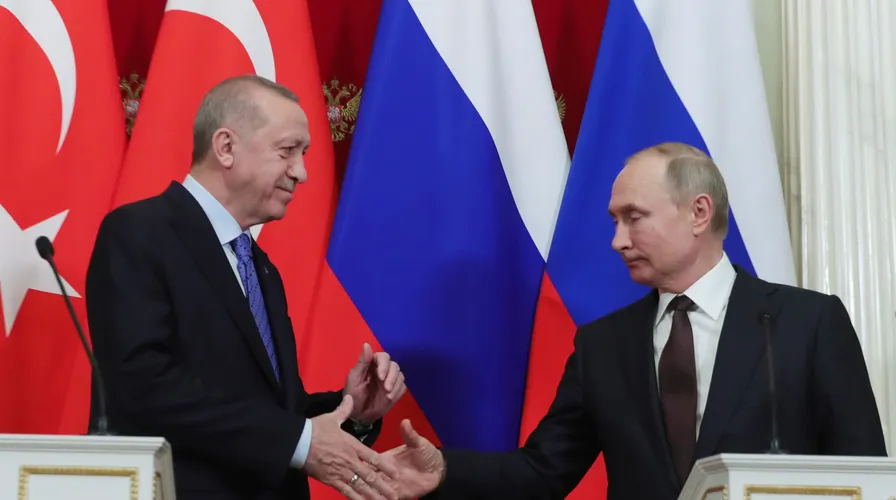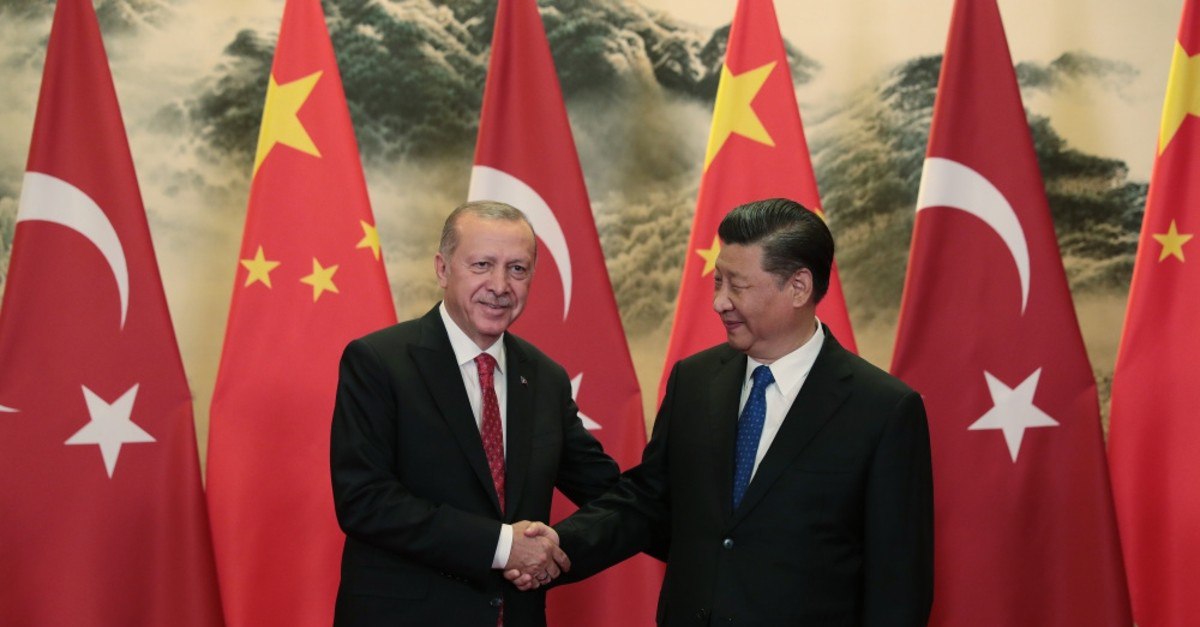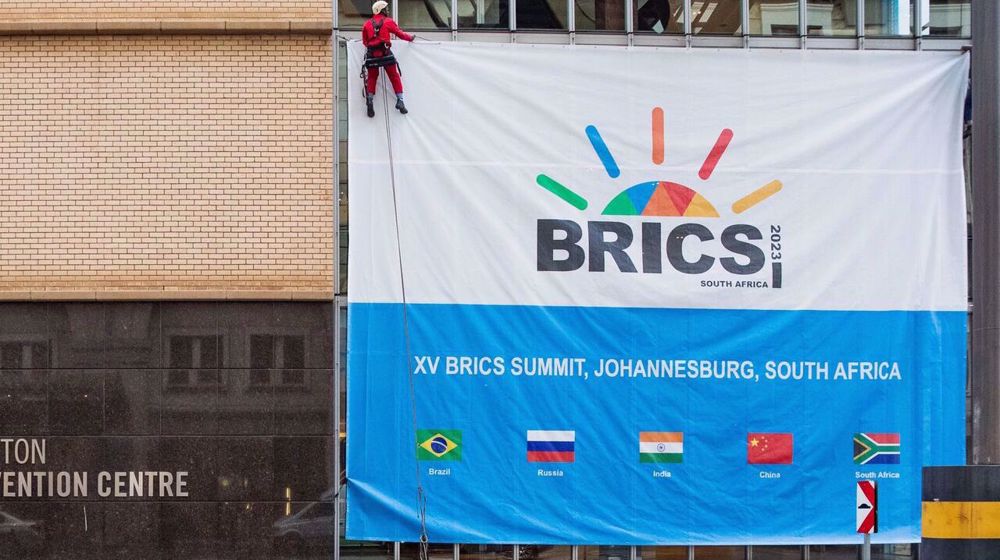BRICS, Shanghai: Will Turkiye Redirect Its Foreign Policy Toward East?

“In recent weeks, Turkiye has reiterated its interest in joining BRICS.”
At a time when experts expect that BRICS will dominate the global economy in the coming decades and represent a major shift in global power dynamics, Turkiye seeks to become the first NATO country to join the group in the wake of the BRICS decision to expand.
The visits made by Turkish Foreign Minister Hakan Fidan to China from June 3 to 5 and to Russia from June 10 to 11 have reignited the debate about the possibility of Turkiye joining the BRICS bloc.
Russian President Vladimir Putin pledges full support for Turkiye's aspirations in the European Union.
Ankara's growing interest in the BRICS bloc has raised questions about whether Turkiye is drifting further away from the West. This coincided with Putin's announcement of the uncertain presence of Turkish President Recep Tayyip Erdogan at the Shanghai Cooperation Organization (SCO) summit that will be held in Kazakhstan soon.
In the past, Erdogan had expressed his country's desire to join the two Chinese-led clubs.
Turkish Efforts
Turkiye recently emphasized that its attempt to join the BRICS group is not related to the issue of changing its foreign policy, criticizing at the same time the lack of commitment by allied countries in NATO to the spirit of the alliance.
Turkish Foreign Minister Hakan Fidan said during a TV interview on June 24 that Turkiye is trying to maintain good relations with BRICS member states, noting that the platforms should be seen as complements to each other, not alternatives.
“What makes BRICS different is the presence of Russia and China in it, which is a platform for economic purposes that is built on rules and has no structure, and differs from the EU in that it includes all civilizations and races,” Fidan said.
“We have membership in both EU and other economic cooperation organizations, and it is possible that we may apply for further membership in the Asia-Pacific Economic Forum,” Fidan added.
Fidan pointed out that President Erdogan is expected to hold talks with Russian President Vladimir Putin on the sidelines of the SCO summit, which will be held in Astana on July 3-4.
Turkiye's outreach to the BRICS group of major emerging nations indicates growing Turkish frustration with faltering EU accession talks.
Turkiye does not have significant trade with the BRICS countries, except for China, and still conducts more than half of its annual trade with the EU.
Ankara has sought to revive its faltering efforts to join the EU, while seeking new alliances that could help expand its more than $1 trillion economy.
Turkiye has long been a member of NATO and has been part of the European defense system, but has failed to make progress in negotiations with the EU since accession talks began in 2005.
Fidan recently said: “There is a military alliance within NATO, but the economic alliance has not yet been achieved. So, our search is still ongoing.”
Fidan's statements appear aimed at motivating the EU to accelerate talks with Turkiye at a time when the country is seeking to achieve a delicate balance in an increasingly polarized world.
It is noteworthy that Turkiye's accession to the EU has become far-fetched, especially in light of the framework set by the EU that defined relations with Turkiye: the EU stipulated that Ankara must conclude a stable trade partnership; establish a barrier to stop the flow of refugees; and stay away from Moscow.

Key Partnerships
Several years ago, Turkish President Recep Tayyip Erdogan expressed interest in joining the SCO, which was founded by Russia and China as an alternative to NATO, and plans to attend the security bloc's meeting in Kazakhstan scheduled for next week.
But the problem is that Chinese and Russian officials are skeptical about the Turkish presence in Shanghai.
They have openly declared that Turkiye's accession to Shanghai does not seem logical at all because this country has been a member of the NATO military alliance for seventy years and is not included in Shanghai's security structure.
The Turkish Foreign Minister had mentioned that Ankara may also submit a request to establish an advanced partnership based on dialogue with the Association of Southeast Asian Nations.
In turn, Turkish Finance Minister Mehmet Simsek said that Turkiye wants to preserve its basic trading partners, such as Europe, instead of moving away from them and joining countries, such as China, Russia, India, Brazil, and South Africa.
Speaking at an event in London organized by the Chatham House think tank, Simsek said that BRICS is primarily a dialogue platform rather than a formal economic bloc, such as the EU.
He added that “the EU remains our primary partner in terms of commercial investments and tourism flows, so we cannot afford to distance ourselves from it.”
“So, we continue to focus on the EU, but that does not mean that we do not look at alternatives if they represent value,” Simsek said.
The SCO, an intergovernmental organization, includes China, India, Iran, Kazakhstan, Kyrgyzstan, Pakistan, Russia, Tajikistan, and Uzbekistan. SCO aims to promote cooperation among its members in the economic and trade fields.
As for BRICS, it is a bloc that came out publicly in 2006 and held its first meetings in 2009. It includes the countries of China, Brazil, Russia, India, and South Africa. BRICS sees itself as an alternative to Western economic hegemony.
It is now seen as a future competitor to the EU and the G7, the world's most advanced industrial economies led by the United States and joined by Canada, France, Germany, Italy, Japan, and the UK.
The total population of the group's countries has expanded to 3.5 billion people, and they now constitute 45% of the world's population.
The total economy of the BRICS countries is $28.5 trillion, representing about 28% of the global economy, in addition to the fact that the BRICS countries also produce 44% of the world's crude oil.
Experts point out that Turkiye's membership would enhance BRICS' geopolitical significance and bolster its influence in Europe, North Africa, Asia, and the Middle East.

Major Change
Turkiye's interest in joining an economic bloc led by China and Russia surprised most Western countries and sparked European rejection.
Analysts caution that joining BRICS could also have drawbacks, potentially straining Turkiye’s relations with the West.
The United States had renewed its position on Turkiye's return to the joint production program for the F-35 fighter and linked it to its abandonment of the Russian S-400 air defense system, which it obtained from Russia in 2019.
American officials considered that the partnership between the U.S. and Turkiye has become stronger than ever, as Turkiye remains entrenched in the West despite the continuing division with Washington over the war on Gaza.
On his part, US Ambassador to Turkiye Jeff Flake expressed his hope that Turkiye would not join the BRICS group. However, Turkiey’s joining BRICS would not lead to a major diplomatic change in Ankara’s relations with the West, according to observers.

In turn, political analyst Ibrahim Khatib explained in a statement to Al-Estiklal that previous Turkish statements regarding joining the SCO and BRICS were issued at times that witnessed problems with both the United States and the EU.
He explained that “the United States and the EU had broken many promises towards Turkiye, which put it in a difficult position.”
“However, reality shows that the East is not necessarily better than the West, as Russia has caused Turkiye great suffering in Syria, while China has persecuted Turkish citizens in East Turkestan,” he noted.
“For this reason, Turkiye makes these statements from time to time either to achieve balance in international politics and expand international relations, or to send warning messages to the West to strengthen its negotiating position,” he said.
Mr. Khatib concluded that “Turkiye's desire to join BRICS or the SCO is not surprising, and does not necessarily mean a break from the West or a full commitment to the East.”









